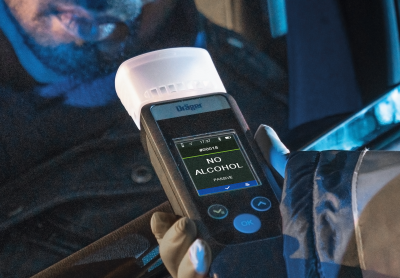Drug and alcohol testing in the spotlight with Draeger
 Mark Burrup, drug and alcohol testing expert at Draeger Safety UK, offers his perspective on how fleet operators can safeguard against employee substance abuse
Mark Burrup, drug and alcohol testing expert at Draeger Safety UK, offers his perspective on how fleet operators can safeguard against employee substance abuse
There are clear indications that the rising prevalence of both drug and alcohol use is becoming an increasingly serious issue within the workplace. Research suggests that one in ten adults has used controlled drugs in the past year, while 15 per cent of adults consume alcohol at levels considered high risk and two per cent show signs of dependency.
This is corroborated by research from leading medical insurer Bupa, which, earlier this year, reported that 34 per cent of respondents in their survey said that they had used, or witnessed substance use or addictive behaviour during working hours.
This suggests that in any organisation, it is likely that some employees will be affected, and this includes those who drive commercial vehicles where clearly exposure to potential harm is not only to the individual but to the public, and the associated corporate impact.
Setting in this context, it is not surprising that vigilance-critical working environments, such as the transport and logistics industries, are increasingly seeing the benefits of introducing drug and alcohol testing programmes.
It is interesting to note, however, that such approaches are not only driven by businesses but increasingly by employees themselves.
Dräger’s annual Safety and Health at Work report has explored this issue in some detail, and in 2023 found that the overwhelming view of respondents was that workplace testing for drugs and alcohol should be part of a wider safety at work initiative.
Nearly three quarters (74 per cent) of those questioned were in favour of all employees in their organisation being tested for drugs and alcohol, with more than a third (35 per cent) saying that this already happens in their workplace, and nearly two fifths (39 per cent) saying that this should happen.
Somewhat reassuringly, the figure for working within the fleet and logistics sector in the UK showed higher levels of testing programmes were already in place at the time of the research compared to other industry sectors, although the figure is still relatively low at 42 per cent.
It therefore appears that employees generally view testing programmes as a positive activity which offers a safety net to support the many, rather than being a means of penalising the few.
 A well-thought-out drug and alcohol policy is especially important where driving is involved. The policy should explain the risks and outline the strategy and controls adopted by the organisation to manage it, while also being fair, transparent and consistent.
A well-thought-out drug and alcohol policy is especially important where driving is involved. The policy should explain the risks and outline the strategy and controls adopted by the organisation to manage it, while also being fair, transparent and consistent.
A strong policy can also support employee health and wellbeing, and promote a culture of responsibility, as well as reduce the chance of litigation, adverse publicity from road traffic accident casualties or fatalities, and the associated financial losses.
Policies should also complement the overall approach to health and safety in the workplace, deployed in a non-punitive way and reviewed regularly.
Monitoring of government and law enforcement figures confirms that the UK is seeing a steady but sure increase in drug and alcohol related driving instances. This will pose a growing challenge to businesses and to their ability to operate productively, and to safeguard employee health and safety.
As a result, testing programmes are becoming increasingly relevant and we are seeing more companies that operate in the transport and logistics sector recognising the importance of managing this aspect of employee safety and of integrating drug and alcohol policies as part of a holistic approach to health and safety in the workplace.
In addition, the use of alcohol Interlock devices has become increasingly prevalent over recent years. Since the introduction of Regulation (EU) 2019/2144 in July 2022, which focuses on the general safety and the protection of vehicle occupants and vulnerable road users, motor vehicles of categories M and N (commercial and passenger vehicles, respectively) have been required to be equipped with certain advanced vehicle systems, including alcohol interlock ports, making installation into newer vehicles much easier.
For those who find the introduction of a testing policy a daunting prospect, Dräger has been working with the Royal Society for the Prevention of Accidents (RoSPA) to develop a comprehensive guide to drug and alcohol impairment in the workplace. This guide is now available from the Dräger website.












